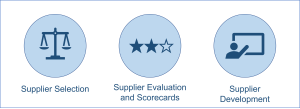3.8 Supplier Quality Management
Supplier Quality Management (SQM) refers to a holistic approach where supplier performance and quality measures are monitored and managed to improve the supply chain’s overall effectiveness. It emphasizes not just cost, but quality and delivery performance, sustainability, and ethical sourcing.
Effective SQM is crucial as suppliers’ performance directly impacts the quality of the final product or service, affecting customer satisfaction. A strong SQM process can minimize defects, reduce costs associated with rework and returns, shorten lead times, and improve overall supply chain responsiveness.
Strategies and Techniques for Supplier Quality Management:
Several strategies and techniques are used in SQM, including:

- Supplier Selection: Choosing suppliers based on their ability to meet quality, cost, delivery, and service requirements.
- Supplier Evaluation and Scorecards: Regularly assessing supplier performance using scorecards on key parameters such as on-time delivery, defect rates, and responsiveness.
- Supplier Development: Working with suppliers to improve their processes, such as through training, process improvements, and technology upgrades.
Supplier Qualification and Certification Process
Supplier qualification and certification is a process where potential suppliers are evaluated against defined standards to ensure they can meet the required quality, cost, delivery, and service requirements. The process often involves assessments, audits, and evaluations of suppliers’ capabilities, capacities, and performance history.
The certification process is crucial as it helps ensure that the supplier is capable of consistently meeting the quality standards. Techniques used include Request for Information (RFI) to gather initial data, onsite audits to verify capabilities, and performance evaluations for final selection.
Supplier Quality Audit Process:
A Supplier Quality Audit is a systematic, independent, and documented process for obtaining evidence to determine the extent to which the supplier’s quality management systems meet the required standards. These audits are vital for identifying any gaps or opportunities for improvement in the supplier’s quality systems.
Audit techniques include document reviews, personnel interviews, observation of activities, and sampling of products or processes. The results are often scored, and non-conformances are addressed through corrective action plans.
Supplier Incoming Inspection Process:
The Supplier Incoming Inspection process involves checking the quality of goods delivered by the supplier before they enter the production process. This is important as it ensures that only conforming materials are used in production, reducing the risk of defects, rework, and delays.
Inspection techniques can vary from a full inspection of all units to sampling inspection based on statistical principles. These inspections often include checks for correct quantity, physical damage, conformance to specifications, and necessary documentation.
Effective Supplier Quality Management, involving qualification, audits, and incoming inspections, is a vital component of overall quality management in the supply chain, directly affecting the end product’s quality and customer satisfaction.